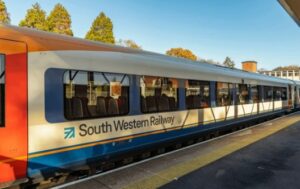 🚆 South Western Railway: Connecting London to the South West
🚆 South Western Railway: Connecting London to the South West
South Western Railway (SWR) is a key pillar of the UK’s rail infrastructure, providing crucial links between London and the South West of England. With a blend of historic routes and modern innovations, SWR plays a vital role in both daily commuting and long-distance travel.
🗺️ Expansive Network Across the South
SWR operates one of the largest networks in the country. From the bustling heart of London Waterloo, its trains reach deep into the counties of Surrey, Hampshire, Berkshire, Dorset, Wiltshire, and Devon. Popular stops include:
Portsmouth and Southsea
Southampton Central
Bournemouth
Exeter St Davids
Weymouth
Salisbury
Guildford
Woking
In addition to mainline routes, SWR also manages the unique Island Line on the Isle of Wight, connecting Ryde and Shanklin with vintage-style trains and scenic coastal views.
🛤️ Backbone of the Commuter Belt
SWR is essential for thousands of commuters traveling into London each day. Its services on the South West Main Line and Portsmouth Direct Line help relieve pressure on the capital’s transport system while offering reliable access to economic hubs in the Southeast.
To meet growing demand, the company continues to increase capacity and reduce journey times, even as it grapples with congestion and aging infrastructure in key corridors.
🚄 Modernising the Fleet: Arterio Trains
One of the most visible signs of SWR’s modernization efforts is the introduction of the Arterio Class 701 trains. These electric trains are designed to improve passenger experience through:
Increased seating capacity
Open carriage layouts for better movement
Air-conditioning and improved accessibility
Digital passenger information displays
These trains are gradually replacing older rolling stock to create a more consistent, sustainable fleet across the network.
🧭 Unique Among Rail Operators: The Island Line
SWR is the only UK rail operator to manage a service entirely on an island. The Island Line, located on the Isle of Wight, underwent a major revamp with the launch of Class 484 trains—refurbished units from the London Underground.
The line not only serves local residents but also draws tourists looking for a nostalgic rail experience with beautiful sea views.
🌱 Sustainability and Innovation
SWR is embracing environmentally responsible practices as part of the UK’s net-zero goals. Some key steps include:
Introducing hybrid and electric trains
Partnering on solar-powered facilities
Trialling biodiesel alternatives on some routes
Supporting bike and e-scooter infrastructure at stations
🧾 Ticketing and Passenger Experience
Travelers on SWR benefit from a range of flexible ticketing options:
Advance and Off-Peak fares for affordable travel
Season tickets for frequent commuters
Digital tickets and smartcards
Railcard discounts for eligible groups (e.g., youth, seniors, disabled)
In case of disruption, the Delay Repay scheme compensates passengers for delays over 15 minutes.
🛠 Challenges and Future Vision
SWR has faced hurdles in recent years, including strikes, weather disruptions, and infrastructure limitations. However, the company is working closely with Network Rail to improve punctuality, modernize signalling systems, and upgrade stations.
Looking ahead, SWR aims to:
Expand capacity in fast-growing regions
Integrate better with other transport modes
Offer more sustainable, tech-driven travel solutions
🏁 To Conclude
South Western Railway continues to evolve, balancing its historic legacy with the demands of 21st-century travel. Whether you’re commuting into London, exploring the countryside, or riding the rails along the coast, SWR offers a vital connection to the rhythm and reach of Southern England.